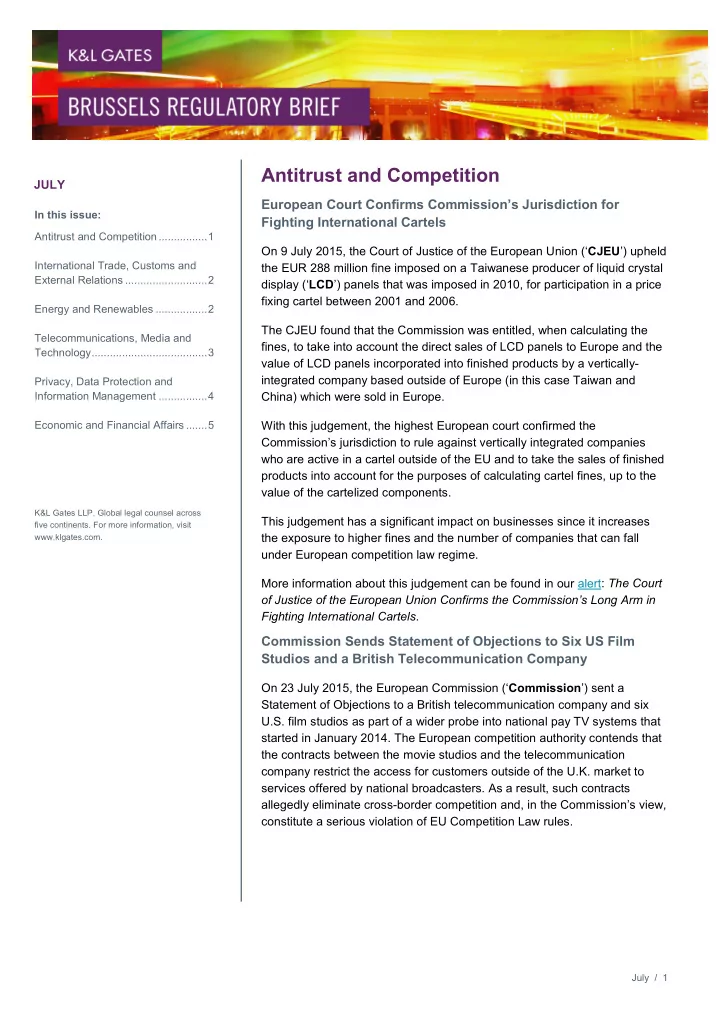

Antitrust and Competition JULY European Court Confirms Commission’s Jurisdiction for In this issue: Fighting International Cartels Antitrust and Competition ................ 1 On 9 July 2015, the Court of Justice of the European Union (‘ CJEU ’) upheld International Trade, Customs and the EUR 288 million fine imposed on a Taiwanese producer of liquid crystal External Relations ........................... 2 display (‘ LCD ’) panels that was imposed in 2010, for participation in a price fixing cartel between 2001 and 2006. Energy and Renewables ................. 2 The CJEU found that the Commission was entitled, when calculating the Telecommunications, Media and fines, to take into account the direct sales of LCD panels to Europe and the Technology ...................................... 3 value of LCD panels incorporated into finished products by a vertically- integrated company based outside of Europe (in this case Taiwan and Privacy, Data Protection and Information Management ................ 4 China) which were sold in Europe. Economic and Financial Affairs ....... 5 With this judgement, the highest European court confirmed the Commission’s jurisdiction to rule against vertically integrated companies who are active in a cartel outside of the EU and to take the sales of finished products into account for the purposes of calculating cartel fines, up to the value of the cartelized components. K&L Gates LLP. Global legal counsel across This judgement has a significant impact on businesses since it increases five continents. For more information, visit the exposure to higher fines and the number of companies that can fall www.klgates.com. under European competition law regime. More information about this judgement can be found in our alert: The Court of Justice of the European Union Confirms the Commission’s Long Arm in Fighting International Cartels . Commission Sends Statement of Objections to Six US Film Studios and a British Telecommunication Company On 23 July 2015, the European Commission (‘ Commission ’) sent a Statement of Objections to a British telecommunication company and six U.S. film studios as part of a wider probe into national pay TV systems that started in January 2014. The European competition authority contends that the contracts between the movie studios and the telecommunication company restrict the access for customers outside of the U.K. market to services offered by national broadcasters. As a result, such contracts allegedly eliminate cross-border competition and, in the Commission’s view, constitute a serious violation of EU Competition Law rules. July / 1
BRUSSELS REGULATORY BRIEF The movie studios and the telecommunication company now have between two and three months to respond to the allegations contained in the Statement of Objections; they can also request an oral hearing to present their comments before the Commission. This Statement of Objections should be regarded in the context of the Commission’s agenda to implement a European Digital Single Market (‘ DSM ’); as part of this policy initiative, unjustified territorial restrictions for selling goods and services online should be eliminated. However, policy makers should take into account that the elimination of the existing movie rights distribution system could possibly lead to higher than average prices for entertainment products throughout Europe and thus harm consumers in several Member States. International Trade, Customs and External Relations TTIP: Round 10 The 10th round of negotiations on the Transatlantic Trade & Investment Partnership (‘ TTIP ’) took place in Brussels on 13-17 July 2015. The parties have announced "a fresh start" after the negotiations have been backed by the decision of the European Parliament on TTIP recommendations and the adoption of the Trade Promotion Authority (‘ TPA ’) by the US Senate. The negotiations were accompanied by a number of stakeholder events organised by the Directorate General for Trade of the European Commission. Markedly, the negotiations focused on the issues of services market access and assessed the creation of a positive list for products and services under the agreement; furthermore the issues of regulatory coherence (e.g. technical barriers to trade, harmonisation of rules in automobile, sanitary, pharma and medical devices sector) have been intensively examined. The parties agreed to postpone debates on other controversial matters such as financial services or rules on Investor State Dispute Settlement (‘ ISDS ’) for the next rounds. TTIP is considered to be the world's biggest trade deal, creating a market of 850 million consumers and accounting for more than half of global economic output. P5+1 and the EU reach an agreement with Iran on sanctions and nuclear programme On 14 July 2015, the P5+1 nations (i.e. the United States, China, France, Germany, Russia, and the United Kingdom), together with the European Union (the ‘ EU ’) and Iran concluded the Joint Comprehensive Plan of Action (‘ JCPOA ’). With this deal, Iran agrees not to develop or acquire nuclear weapons in exchange for the gradual lifting of EU, US and UN sanctions. The JCPOA is expected to have a considerable economic impact on business and trade with Iran. However, the lifting of the sanctions will not be immediate but will gradually take place in the coming years, following a positive assessment by the International Atomic Energy Agency (the ‘ IAEA ’) regarding Iran’s fulfilment of its obligations. Current measures against Iran provide for travel bans and asset freezing against specific individuals and entities and sanctions in certain areas, including finance, energy, transport, metals and software. More information concerning the deal can be found in our alert: EU Focus: Iranian Nuclear Accord Reached, but Specific Implementation of Meaningful EU Sanctions Relief Will Not Be Immediate . Energy and Renewables The European Parliament has adopted the CO2 market stability reserve On 8 July 2015, the European Parliament endorsed a reform of the EU Emissions Trading Scheme (‘ ETS ’), which was informally agreed with the Latvian Presidency of the Council of the EU (‘ Council ’). The new scheme - July / 2
Recommend
More recommend